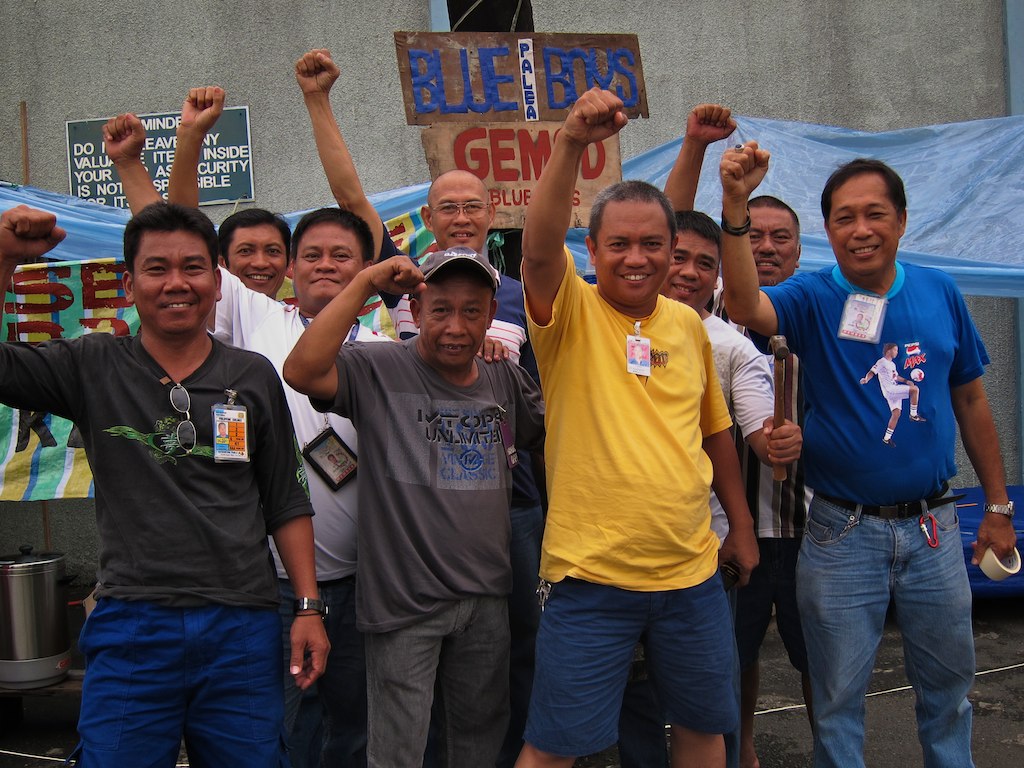Written by: Kirsten Han
I’m Singaporean. For me, attending a protest is akin to going to some sort of rare carnival. It’s not unlike a bright-eyed tourist preparing to go to some local attraction. So when I found myself signing in at the registration booth of the PALEA protest camp on 8 October, I felt just like I would have if I had been entering Resorts World Manila instead.
The whole thing began when Philippine Airlines (PAL) announced their plans to outsource the jobs of about 2600 of its ground crew workers. The case was taken to the courts, and is currently pending a decision from the Court of Appeal. However, PAL decided to go ahead with the outsourcing anyway, which led PALEA – one of the oldest unions in the Philippines – to call for a work stoppage on 27 September in protest. Next they knew, they found themselves logged out of the PAL computer systems and terminated.
Since that day, members of the Philippine Airlines Employees Association (PALEA), supported by other labour rights groups, have been camped out 11 days (and from what I understand, they’re still there). The protestors are now saying that the terminations should be treated as illegal dismissals.
Located in a smallish car park on the way to the Ninoy Aquino International Airport, the protest camp is a modest-looking affair, but organised. People had to register when they first arrived, and were issued little orange triangles. Sheltered areas were divided into the various ground crew departments represented by PALEA: catering, maintenance, cargo, etc. In the middle of the camp the vice-president of the Association was giving a talk about contractualisation policy, and they had a concert organised for that evening.
There were people camped right against the gate of PAL’s flight center, blocking them from bringing any equipment out. In response, PAL had set up a banner over the gate, stating that it is a crime to disrupt airport operations. No one seemed to pay it much mind, though.
I don’t know where this protest is going to go. The workers have already been terminated, and PAL announced that they are going ahead with the outsourcing. It seems to be a trend everywhere; regular jobs are making way for contract ones, where companies don’t have to shell out as much for wages and benefits, and liability is limited. It seems like a tough fight to win. But PALEA has all my respect for trying.
As a Singaporean I grew up to scorn protests, demonstrations and strikes. I saw them as subversive, dangerous and detrimental to our perilously balanced law and order. I laughed at countries that allowed strikes and protests, mocking them for the work stoppages and lost revenue. “How stupid of them,” I thought. “Look, now they’re all in a mess.” It was only in the past two years that I began to realise how misguided such thoughts were.
As I walked with Don from youth organisation Samahang Demokratiko Ng Kabataan (SDK) through the PALEA protest camp, I said, “You know, this isn’t allowed in Singapore.”
He laughed. “Yeah, I know. Hah, Singapore.”
I didn’t stay very long at that camp, because I didn’t have that much time to spare. I left with still plenty more to learn about the issues, and plenty more to learn about the Philippines. Nothing very significant happened at that camp while I was there, but just walking through it and seeing the people as they were was an experience for me. They had something they wanted to say, and they weren’t afraid to stick it out to say it. They knew it was their right and they weren’t going to give up. They weren’t cowed by being terminated, or by PAL claiming that they were doing something illegal.
And no matter what was going on, they weren’t going to willingly give up their freedom for anything. There would be no trade-off.
That for me, was something different.

The Blue Boys, from the Maintenance department of PAL.


